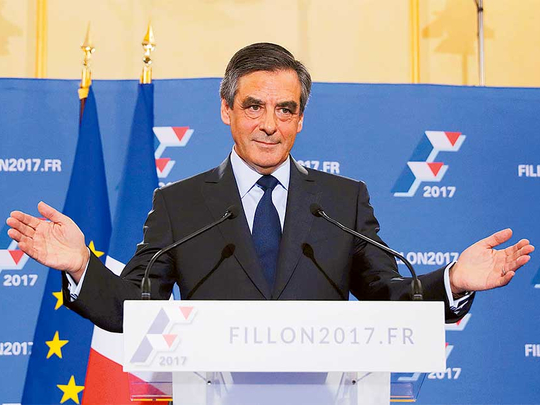
Paris: Former Prime Minister Francois Fillon completed an unexpected victory in the French Republican presidential primaries on Sunday, as rifts within the beleaguered Socialist government broke into the open.
Fillon, a former prime minister and lifelong politician, won his party’s nomination in a landslide, claiming about 67 per cent of the 4.5 million votes cast, the election authorities said.
Republican supporters picked a candidate promising painful economic reforms, a shrunken state and unabashedly embracing traditional values as Prime Minister Manuel Valls signalled he’s prepared to challenge President Francois Hollande for the Socialist ticket if the incumbent decides to seek a second term.
With the Republican candidate in place, former Economy Minister Emmanuel Macron a declared candidate and the National Front’s Marine Le Pen already campaigning, the pressure is increasing on Hollande and the Socialists to sort out their own plans. Hollande, the least popular president in half a century, has promised to state his intentions within weeks while Valls made the strongest statement yet of his own plans over the weekend.
The right has chosen its candidate and “the question will be asked very rapidly: who will be their strongest opponent?” the prime minister said in an interview published Sunday by the Journal du Dimanche. “I am preparing. I am ready.”
Fillon romped to victory in his party’s primary on promises to lengthen the working week, raise the retirement age and cut €100 billion (Dh388 billion) from government spending. He’s also proposing a €40 billion tax-cut for companies and a constitutional ban on planned budget deficits.
“Fillon has an audacious programme that restores the authority of the state, which the French are waiting for,” Philippe Goujon, a Republican lawmaker, said Sunday night in an interview at the candidate’s victory party. “He brings together the liberals, nationalists, Gaullists, the authoritarian right. It will pull in voters from the National Front. Look at his margin of victory — It’s a tidal wave.”
Still, Fillon’s programme leaves room for a pitch to centrist voters, and offers little to challenge Le Pen’s support among blue-collar workers.
“You now have a conservative right, which has vision of French life from the 1960s and vision of the economy from the UK of the 1980s,” Macron said on France 2 television. “On the other side you have the left proposing social justice that doesn’t work. I want to bring France into the 21st century.”
The Socialists efforts to convince voters that they can take the country forward have been hamstrung by Hollande’s record in office. The president has seen economic growth lag that of Europe as a whole and more than 200 people have died in terrorist attacks in two years. His approval rating dropped as low as 4 per cent in one recent poll. The president’s spokesman denied reports on Sunday that Hollande was planning a reshuffle of his cabinet imminently.
Le Pen spokesman Nicolas Bay tweeted that Fillon “doesn’t have the ability to rally the blue-collar vote,” echoing a point Valls also made in his Sunday newspaper interview.
As Hollande dithers, other candidates across the political spectrum are making their moves. Francois Bayrou, who has run in the past three presidential elections, had pledged not to run again should Juppe win the primary and he may now throw his hat into the ring. Jean-Luc Melenchon, a former Socialist Minister who placed fourth with 11 per cent of the first-round vote in 2012, won the backing of the Communist Party Saturday.
Arnaud Montebourg, the former Industry Minister who is also seeking the Socialist nomination, called on the left to pull itself together.
“Against Francois Fillon, we need a candidate who is at the heart of the left, not a free-market socialist,” Montebourg said. “We too can unite in a primary.”












